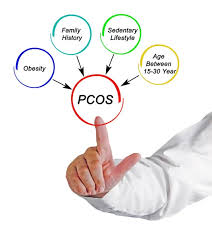Polycystic Ovary Syndrome
An article by Dr Deepika Kohli – a well-known Dietitian/Nutritionist in Mayur Vihar Ph-I, Delhi and has an experience of 26 years in this field. Ms. Deepika Kohli practices at Deepika’s Diet Clinic in Mayur Vihar Ph-I, Delhi, Jeevan Anmol Hospital in Mayur Vihar Ph-I, Delhi and Life Care Centre in Preet Vihar, Delhi. She is a Certified Diabetes Educator ) from Pfizer in 2011. She is a member of Indian Dietetic Association. Some of the services provided by the doctor are: Diabetic diet, PCOD Diet, Weight Gain Diet Counselling, Therapeutic Diet’s and Weight Loss Diet Counselling etc. Must read… Dr. Purnima Sharma – Sec. Gen. WOW India & Editor of WOW Website…
* *Understanding Polycystic Ovary Syndrome
(PCOS): Symptoms and Dietary Management* *
Polycystic Ovary Syndrome (PCOS) is a hormonal disorder that affects people with ovaries, typically during

their reproductive years. PCOS is characterized by an imbalance of reproductive hormones, which can lead to a
variety of symptoms and potential complications. While the exact cause of PCOS is not fully understood, factors such as genetics, insulin resistance, and inflammation are believed to play a role in its development.
PCOS is a complex condition that involves a combination of hormonal imbalances, metabolic disturbances, and reproductive issues. One of the hallmarks of PCOS is the presence of small fluid-filled sacs (cysts) on the ovaries, which can interfere with normal ovulation and menstrual cycles.
* *Symptoms of PCOS in Young Girls* *
PCOS can present differently in individuals, but common symptoms in young girls may include:
- * *Irregular Menstrual Cycles**: Girls with PCOS may experience irregular periods or may go for long stretches without menstruating.
- * *Excessive Hair Growth (Hirsutism)**: PCOS can cause increased hair growth on the face, chest, back, or other areas of the body due to elevated levels of androgens (male hormones).
- * *Acne**: Hormonal imbalances associated with PCOS can lead to acne breakouts, particularly along the jawline and chin.
- ** Weight Gain**: Many girls with PCOS struggle with weight management, as insulin resistance and hormonal imbalances can contribute to weight gain, especially around the abdomen.
* *Dietary Management for PCOS**
Diet plays a crucial role in managing PCOS symptoms and promoting overall health. A wellbalanced diet can help regulate blood sugar levels, reduce insulin resistance, manage weight, and improve hormonal balance. Here’s a detailed look at dietary recommendations for individuals with PCOS:
- * *Emphasize Whole Foods**: Focus on whole, minimally processed foods such as fruits, vegetables, whole grains, lean proteins, and healthy fats. These foods provide essential nutrients and fiber while minimizing added sugars and refined carbohydrates.
- * *Choose Low-Glycemic Index (Gl)
Carbohydrates**: Opt for carbohydrates that have a low glycemic index, which means they cause a slower and more gradual increase in blood sugar levels. Examples include whole grains (e.g., quinoa, barley), legumes, fruits, and non-starchy vegetables.
- * *Balance Macronutrients**: Aim for a balanced intake of macronutrients, including carbohydrates, proteins, and fats, to help stabilize blood sugar levels and promote satiety. Include lean proteins such as poultry, fish, tofu, and legumes in your meals.
- * *Healthy Fats**: Incorporate healthy fats such as avocados, nuts, seeds, and olive oil into your diet. These fats can help improve insulin sensitivity and reduce inflammation.
- * *Limit Added Sugars and Refined
Carbohydrates**: Minimize consumption of foods and beverages high in added sugars, refined carbohydrates, and processed foods. These foods can cause spikes in blood sugar levels and exacerbate insulin resistance.
- * *Moderate Dairy Intake**: Some research suggests that high dairy intake may worsen PCOS symptoms due to its potential impact on insulin levels and hormonal balance. Choose dairy products in moderation and opt for low-fat or non-dairy alternatives if needed.
- * *Stay Hydrated**: Drink plenty of water throughout the day to stay hydrated and support overall health.
- * *Manage Portions**: Pay attention to portion sizes to avoid overeating, which can contribute to weight gain and insulin resistance.
In conclusion, PCOS is a complex hormonal disorder that can present with a variety of symptoms in young girls. Dietary management plays a crucial role in managing PCOS symptoms and promoting overall health. By emphasizing whole foods, choosing low-glycemic index carbohydrates, balancing macronutrients, and limiting added sugars and refined carbohydrates, individuals with PCOS can support hormone balance, regulate blood sugar levels, and improve their overall quality of life. Consulting with a healthcare provider or registered dietitian can provide personalized guidance and support for managing PCOS through diet and lifestyle modifications.

